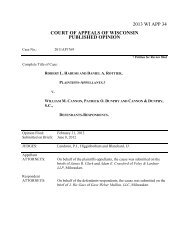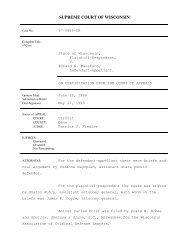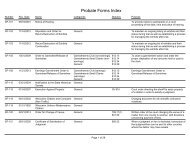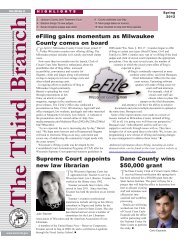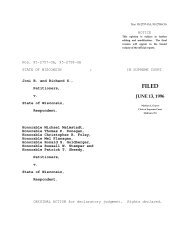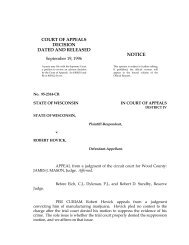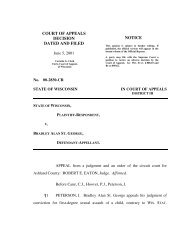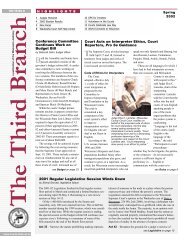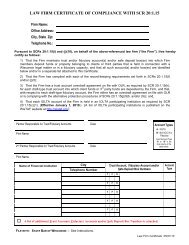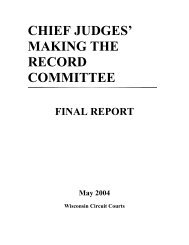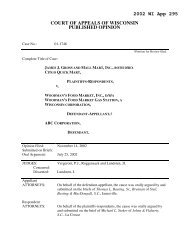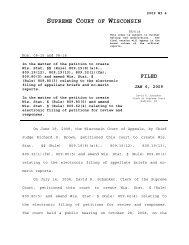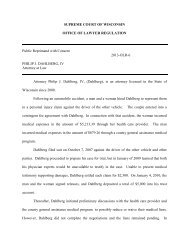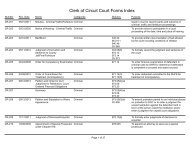Third Branch, srping 2010 - Wisconsin Court System
Third Branch, srping 2010 - Wisconsin Court System
Third Branch, srping 2010 - Wisconsin Court System
You also want an ePaper? Increase the reach of your titles
YUMPU automatically turns print PDFs into web optimized ePapers that Google loves.
2Spring<strong>2010</strong>THE THIRD BRANCHDirector’s column: The legislative season endsBy A. John Voelker, Director of State <strong>Court</strong>sEach spring, baseball coaches at every level of the gamedevelop strategies for the new season. Similarly, at thebeginning of each legislative session, the court systemdevelops a strategy to accomplish its legislative goals.With the start of a new baseball season and the end ofanother legislative sessionupon us, it seems like a goodtime to look back to see whatwe accomplished.Due in part to the state’sfinancial difficulties, we didnot achieve all that we hadhoped this session. Forexample, we put on hold anyproposals to add judgeships.But I’m happy to reportsuccess in achieving many ofthe goals established by theA. John VoelkerLegislative Committee of theJudicial Conference – goalsaimed at providing more efficient use of judicial resourcesand improving the administration of justice.This agenda represents just one aspect of my office’slegislative efforts; often, we are also called on to support oroppose someone else’s proposal. For example, we recentlyworked with legislators and built support among advocacygroups to significantly modify a proposal that would havecreated an unnecessary burden for judges handlingtemporary restraining orders and injunctions.The nature of the legislative process requires us to keep aconstant watch on legislative developments and to workyear-round to build strong relationships with legislators.When the time comes, we need to be prepared to develop astrategy and react quickly.That’s true to some extent with our own initiatives, but theagenda adopted by the Legislative Committee also offers usan opportunity to be more proactive. We are able to pursueissues we know are important to judges and courts, such asa reduction in unnecessary proceedings and paperwork.Here are some of the highlights from the <strong>2010</strong>-11legislative session:Information sharing to assist in child welfareSenate Bill 375, which is nearing final consideration,would permit the director of state courts, the juvenile courtand the Department of Children and Families (DCF) toenter into an agreement to allow for the transfer ofelectronic records that are contained in the CCAP system toDCF and for the transfer of electronic records that arecontained in SACWIS (Statewide Automated Child WelfareInformation <strong>System</strong>) to the Director of State <strong>Court</strong>s Office.The agreement must specify what types of information maybe transferred. These proposals were headed toward finalapproval at publication time.We are fortunate that the legislators who chair keycommittees are receptive to our ideas on how to improve thecourts. We also had the advantage of judges willing to takethe time to review the bills for potential problems. Theyhelped our “batting average” this legislative session, and Ithink we won more than we lost.With the exception of a clean-up session, this legislativesession has come to a close. But we will continue to stay ontop of our game and monitor developments.Joint Review Committee on CriminalPenaltiesWhen the criminal penalty statutes were revised as part ofTruth-in-Sentencing, the Legislature created the JointReview Committee on Criminal Penalties. This committeewas to report how legislative proposals would fit into thepenalty structures and categories of crimes created in 2001Act 109. Unfortunately, the committee never met and billsweren’t referred for review. Thanks in part to ourprompting, the committee is meeting, and we have providedtestimony on several bills considered by the committee.Probation supervision in second- and thirdoffenseOWI casesStatutes limited the effectiveness of courts in dealingwith repeat drunk drivers by preventing probation until thedefendant was accused of at least a fourth offense. <strong>2010</strong>Act 100, effective July 1, <strong>2010</strong>, allows the court to imposemore restrictive conditions on the second and third offenseOWI offenders and allow the court to more closelymonitor their behavior.Pilot treatment program for second- andthird-offense drunk driversIn the 2005 legislative session, the Legislature gavestatutory authority for Winnebago County to establish apilot program to offer incentives for OWI offenders to seektreatment. The pilot has been successful in promotingtreatment and saving money on jails. <strong>2010</strong> Act 100expanded statutory authority to all counties to establish thistype of program.OAR procedures and penalties<strong>Wisconsin</strong> has a large number of drivers with suspendedor revoked licenses, leading to substantial operating aftersuspension and operating after revocation violations. Theseviolations require significant judicial resources to process.Some actions that can lead to suspension do not involveviolations of rules of the road. Failure to pay non-trafficfines or forfeitures, for instance, can lead to suspension of adriver’s license. The statutes also currently require theDepartment of Transportation to administratively revoke thelicense of a driver with four operating after suspensionviolations, regardless of whether these violations wererelated to the rules of the road.<strong>2010</strong> Act 8 allows a discretionary, rather than mandatory,suspension for violations of the controlled substance law.Other legislation affecting OAR also was approved: <strong>2010</strong>Act 17 requires that courts extend the opportunity todefendants to pay traffic forfeitures in installments beforeordering suspension of drivers licenses; 2009 Act 103streamlines procedures for license reinstatement.see Director’s column on page 11



